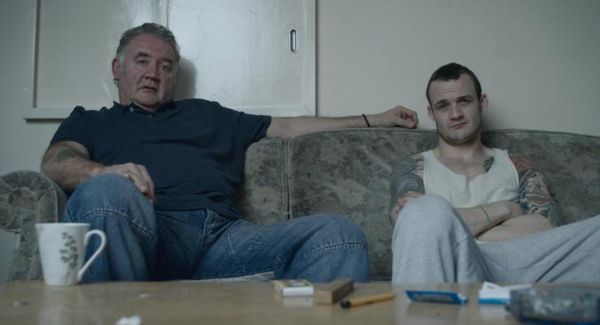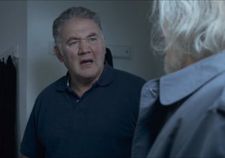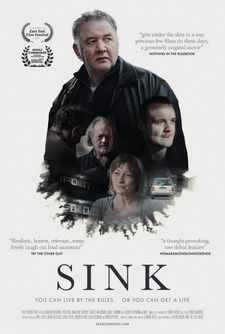 |
| Martin Herdman and Josh Herdman in Sink |
A slice of social realism served with a twist, Sink is the story of Micky (played by Martin Herdman), a skilled manual worker with responsibilities that become overwhelming after he loses his job, prompting him to take a new direction in life. It's written and directed by Mark Gillis, who was keen to talk about the issues it addresses and why he came to make it.
“I suppose there’s two strands to it," he begins. "One is that I live in the area where it’s set. There’s some really troubled estates around and from just about every direction you see the skyscrapers of Canary Wharf with the great bank names on the tops of them. It made me more and more angry as time went on, you know, that nothing happened after the crash, now ten years ago, nobody was ever brought to justice for it even though it was a huge fraud. I mean, as well as the financial devastation it was caused at its root by a massive fraud around derivatives that they knew were worthless and they carried on selling them and all that. And as a result of that, the people that you drive past in the estate are having incredibly difficult lives.
“So I suppose that was the spur of that, you know, when there’s something you want to write about that makes you angry or that it occurs to you that you feel strongly about. Obviously if it’s just that it’s an essay or an article, but what makes it a drama is the other side and that was this idea of this man looking after – as a lot of people do now – a generation above and below. And I see guys around like that and know people who’ve lost that sort of traditional working class job, and that grew on me more and more strongly.
 |
| Talking man to man |
“I think the image of the three generations of men, as well, so you have Micky who had this skilled manual labour job as a toolmaker, and his father, the grandfather figure, who always had work, and then the son who’s never really had a relationship with work, and that really interested me – three generations of working class men and how that relationship could work and change over those three generations. So I think it’s a combination of the general and the specific, and eventually they come together and you feel that there’s a story there that can move forward.”
We discuss the idea of generational poverty, its myths and realities.
“I think it’s a really difficult thing to break when families are in that cycle,” Mark says. “It’s an incredibly difficult process to break out of. You know, it’s appalling that so much of what society’s structured on has changed as a result of people who are phenomenally rich trying to get richer by committing fraud. Nothing changes, nothing happens, nothing gets resolved. I mean there are changes to the banking restrictions but they’re pretty minimal in terms of how the whole thing functions. And what has never happened, well, there has never been an inquest that said ‘This person did this and this person did this...’ That’s never happened.”
Mark has a strong background in television, mostly as an actor. I ask him why he decided to tell this story through a film rather than a television series.
“Strangely, it was always a film,” he says. “It was always fairly self-contained. I’ve done a lot more theatre than anything else actually, as an actor, and I’ve also written a couple of plays. But no, this was always a film, I think because it’s a very contained story both in its geography – in the sense that it is all packed into this area where I am – but also in that I wanted to finish that story, I didn’t want it to be something that was going on and on. There’s a sort of moral ambiguity that runs through the film and I didn’t want to answer that moral question.”
Describing Micky’s actions in the film, he makes it clear that they look very different to him when considered in light of what people involved in causing the crash got away with, but he wants viewers to make their minds up for themselves.
I suggest that it’s easy for people who have never really struggled to make ends meet to look down on those who resort to crime without realising how much less choice they have.
“Completely!” says Mark. “And it’s as if financial crime isn’t a crime... It’s almost like the sums involved are so massive and the people controlling that have such vast salaries that the normal rules can’t really apply because they’re so successful. And I just find that appalling.”
One of the challenges of the film, I note, is that Micky’s situation gets worse in a slow, incremental way. How did Mark approach that in order to tell the story in the space offered by the film?
 |
| Sink poster |
“That was really important to me,” he says, “because normally the screenwriting guru approach would be that you have a single threat or a single quest and that you identify that early on in the film and then you put the character on to that kind of treadmill to find or escape from the one thing, and it seems to me that most people aren’t living their lives like that. Most people don’t have, you know, the drug dealer who turns up and says ‘Your son owes me 20 grand and I’m going to kill him if you don’t come up with the dosh.’ That would be the obvious way to do it but I don’t think that’s most people’s experience. Most people’s experience, I think, is this kind of death by a thousand cuts. It’s not the big thing, it’s lots of little things, but it’s the cumulative effect of that, that builds up and builds up. Any of those things, taken individually, you could argue ‘So what?’ But when you’re living in that situation where there’s absolutely no financial wriggle room and one of these things happens and you just about get yourself stable again and then another thing hits and then another – it’s that constant bombardment that just wears people down. And normal life becomes impossible.
“So I didn’t want to do the normal thing because I wanted to mirror people’s experience of living on zero hours and that kind of on/off lifestyle. So it’s real rather than film-real.”
The risk with all this, of course, is that it gets very grim, but Mark has a background in comedy and there’s quite a lot of observational comedy running through the film. Was that an important element for him?
“Yeah, it was, for exactly that reason. There are two things actually. Again, most people don’t live in that world that films often show working class people living in, where it’s all on one level and it’s pitched very high and you see people screaming and shouting and having a terrible time. The vast majority of people still laugh, they still speak to people in a reasonable way and they still fall in love. You know, just because they’re living in a council estate doesn’t mean they don’t do all those things, they just live in a council estate. And humour really helped with that because humour can give something a humanity and a roundedness so that it isn’t so two dimensional. And then the other thing about it was that it can be very grim and often what happens, I think, is that if you’re being bombarded with stuff that you feel you have to stop getting to you because it’s so grim, there’s a natural defence, I think.
“If you want your story to have a bit of punch, paradoxically, as a storyteller, you have to soften that up in order for the punch to land. So it’s a very pragmatic and practical view as well as trying to be realistic about it.”
In part two, Mark Gillis talks about community, creating atmosphere and shooting Sink.
Sink is in UK cinemas from Friday 12 October.





















